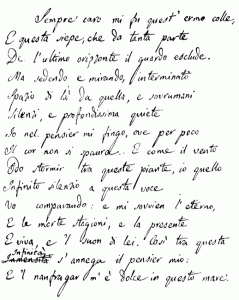Giacomo Leopardi is generally described as the greatest Italian lyric poet but you don’t really need to know anything about him to appreciate his poem L’Infinito. I see the title often translated as The Infinite, but I am not sure that means anything in English, so I am going to opt for Infinity. Here then is my attempt at rendering some of its sound and meaning in English.
Infinity
I always have felt fondness for this lonely hill
and for this hedge which screens off
such a large part of the furthermost horizon.
But as I sit and gaze, in my thoughts I envisage,
beyond it, boundless space and utter silence
and deepest still, so that it almost makes
my heart take fright. And as I hear
the rustling of the wind among these plants,
I start comparing that unending silence
with this noise and I am reminded of
eternity, and seasons gone and dead and
of the season now alive and of its sounds. And so
in this immensity my thoughts sink and drown
and shipwreck feels sweet in this ocean.
(Translation by Phillip Hill)
(Listen to the translation)
And here is the Italian original –
L’infinito
Sempre caro mi fu quest’ermo colle,
e questa siepe, che da tanta parte
de l’ultimo orizzonte il guardo esclude.
Ma sedendo e mirando, interminati
spazi di là da quella, e sovrumani
silenzi, e profondissima quiete
io nel pensier mi fingo; ove per poco
il cor non si spaura. E come il vento
odo stormir tra queste piante, io quello
infinito silenzio a questa voce
vo comparando: e mi sovvien l’eterno,
e le morte stagioni, e la presente
e viva, e il suon di lei. Così tra questa
immensità s’annega il pensier mio:
e il naufragar m’è dolce in questo mare
In the neighbourhood where I used to live a few years ago I often ran into an Italian teacher at the local newsagent’s. I never found out her name, but I think her initials must have been F.R. because she was frumpish, fractious and frosty. I felt really sorry for her students and since she complained about them constantly I often found myself defending them. Once she said that they had downloaded a version of L’Infinito from the internet in which the last verse had been changed from e il naufragar m’è dolce in questo mare (and shipwreck feels sweet in this sea) to e in questo mare il naufragar m’è dolce (and in this sea shipwreck feels sweet). I told her that I thought the students’ version was just as good as Leopardi’s and she almost walloped me with her lumpy and voluminous handbag. But writers make changes too, as you can see from one of Leopardi’s manuscript versions in the picture at the top.
I still think the second version is as good, because ending the poem with the world “sweet” gives the poem a sense of release. But as I have looked at it more carefully to translate it I have now realized that “mare” the last word can also be read in Italian giving full value to its two syllables, so as to make the word almost sound like the sea itself and you can almost hear the sound of sinking or launching into the sea. Because of this I have taken the liberty of replacing the word sea for mare with ocean, which has a sonority which is closer to the original.
One word it is difficult to translate is sovrumani in line 5 of the original . Sovrumani could I think most accurately but very clumsily be rendered as “more than human”. Utter is the most satisfactory solution I could find. It sounds right to me and utterness is definitely more than human.
The penultimate line has s’annega – literally “drowns itself”. I didn’t feel this was reflected well by “drown” because of the overtones of “to be drowned out” which it is possesses. “Sink” might have sounded too comfortable, – the idea of sinking into an armchair. Combining them into sink and drown seems to me to give a clear equivalent of the Italian as well as a few needed syllables.
Below you can listen to the Italian original read beautifully by Mimmo Pelini. For more of his poetry readings in Italian go to tatusc on YouTube.

rileggendola a distanza di tempo
, la versione inglese è ancora più bella